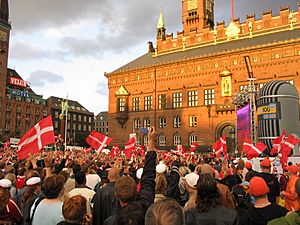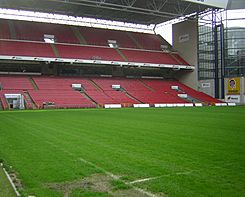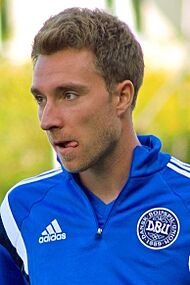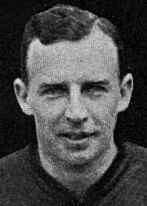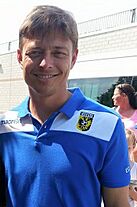Denmark national football team facts for kids
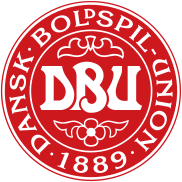 |
||||||||||||||||||||||||||||||||||||||
| Nickname(s) | De Rød-Hvide (The Red and Whites) Danish Dynamite |
|||||||||||||||||||||||||||||||||||||
|---|---|---|---|---|---|---|---|---|---|---|---|---|---|---|---|---|---|---|---|---|---|---|---|---|---|---|---|---|---|---|---|---|---|---|---|---|---|---|
| Association | Dansk Boldspil-Union (DBU) | |||||||||||||||||||||||||||||||||||||
| Confederation | UEFA (Europe) | |||||||||||||||||||||||||||||||||||||
| Head coach | Brian Riemer | |||||||||||||||||||||||||||||||||||||
| Captain | Pierre-Emile Højbjerg | |||||||||||||||||||||||||||||||||||||
| Most caps | Christian Eriksen (144) | |||||||||||||||||||||||||||||||||||||
| Top scorer | Poul Nielsen Jon Dahl Tomasson (52) |
|||||||||||||||||||||||||||||||||||||
| Home stadium | Parken Stadium | |||||||||||||||||||||||||||||||||||||
| FIFA code | DEN | |||||||||||||||||||||||||||||||||||||
|
||||||||||||||||||||||||||||||||||||||
| FIFA ranking | ||||||||||||||||||||||||||||||||||||||
| Current | 10 |
|||||||||||||||||||||||||||||||||||||
| Highest | 3 (May 1997-August 1997) | |||||||||||||||||||||||||||||||||||||
| Lowest | 51 (6 April 2017) | |||||||||||||||||||||||||||||||||||||
| Elo ranking | ||||||||||||||||||||||||||||||||||||||
| Current | 14 |
|||||||||||||||||||||||||||||||||||||
| Highest | 1 (June to October 1916) | |||||||||||||||||||||||||||||||||||||
| Lowest | 65 (May 1967) | |||||||||||||||||||||||||||||||||||||
| First international | ||||||||||||||||||||||||||||||||||||||
(London, England; 19 October 1908) |
||||||||||||||||||||||||||||||||||||||
| Biggest win | ||||||||||||||||||||||||||||||||||||||
(London, England; 22 October 1908) |
||||||||||||||||||||||||||||||||||||||
| Biggest defeat | ||||||||||||||||||||||||||||||||||||||
(Breslau, Germany; 16 May 1937) |
||||||||||||||||||||||||||||||||||||||
| World Cup | ||||||||||||||||||||||||||||||||||||||
| Appearances | 6 (first in 1986) | |||||||||||||||||||||||||||||||||||||
| Best result | Quarter-finals (1998) | |||||||||||||||||||||||||||||||||||||
| European Championship | ||||||||||||||||||||||||||||||||||||||
| Appearances | 10 (first in 1964) | |||||||||||||||||||||||||||||||||||||
| Best result | Champions (1992) | |||||||||||||||||||||||||||||||||||||
| CONMEBOL–UEFA Cup of Champions | ||||||||||||||||||||||||||||||||||||||
| Appearances | 1 (first in 1993) | |||||||||||||||||||||||||||||||||||||
| Best result | Runners-up (1993) | |||||||||||||||||||||||||||||||||||||
| Confederations Cup | ||||||||||||||||||||||||||||||||||||||
| Appearances | 1 (first in 1995) | |||||||||||||||||||||||||||||||||||||
| Best result | Champions (1995) | |||||||||||||||||||||||||||||||||||||
|
Medal record
|
||||||||||||||||||||||||||||||||||||||
The Denmark national football team represents Denmark and Greenland in international men's football games. It is managed by the Danish Football Association (DBU). Their home stadium is Parken Stadium in Copenhagen.
Denmark won an unofficial football competition at the 1906 Intercalated Games. They also earned silver medals at the 1908 and 1912 Olympics. For many years, Danish players were not allowed to become professionals at foreign clubs. This meant Denmark did not qualify for the FIFA World Cup until 1986. However, they did win another Olympic silver medal in 1960.
Since the 1980s, with the famous "Danish Dynamite" team, Denmark has been very competitive. Their biggest win was the 1992 European Championship in Sweden. They beat the defending champions the Netherlands in the semi-final. Then, they defeated world champions Germany in the final. They also won the 1995 King Fahd Cup, beating Argentina. Their best World Cup result was in 1998, when they lost 3–2 to Brazil in the quarter-finals. Denmark also reached the round of 16 in 1986, 2002, and 2018. More recently, at Euro 2020, they reached the semi-finals, losing to England after extra time.
Contents
Danish Football Teams
Besides the main men's team, Denmark has a women's national team. They also have youth teams for both boys and girls, like the under-21 national team. Historically, the main team played in the Olympics until 1988. After that, Olympic games became under-21 matches.
Denmark also has a special team called Ligalandsholdet. This team is made up of the best Danish footballers from Nordic leagues. It was created in 1983 and plays unofficial games during the winter break. Sometimes, people call it Denmark's B-team. The national team coach uses these games to test new players for the main team.
History of Danish Football
Early Years and Olympic Success
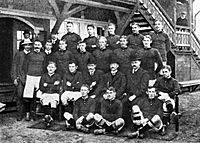
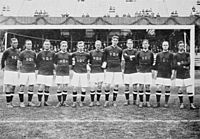
Denmark played its first unofficial game on April 12, 1896, winning 9–0 or 15–0 in Athens. On April 18, 1897, a Danish team beat a Hamburg-Altona team 5–0 in Hamburg.
The first official football tournament at the 1908 Olympics saw Denmark win a silver medal. They won another silver at the 1912 Olympics. From 1912 to 1920, Denmark was often ranked number one in the world by the Elo ranking. Their first official national match was on October 19, 1908, at the Olympics in London. Denmark beat France's second team 9–0.
For many years, Denmark did not have much international success after the first World Cup in 1930. The Danish Football Union (DBU) mostly focused on friendly matches and the Nordic Championship. When they started playing in the Olympics again, they won a bronze medal at the 1948 Olympics.
Football remained an amateur sport in Denmark for a long time. Many top Danish players moved abroad to play professionally. The DBU did not allow professional players on the national team. This made it hard to build a strong team.
Denmark had another good period at the 1960 Olympics, winning a third silver medal. They also finished fourth at the 1964 European Nations' Cup. However, this was partly because they had an easier path to the semi-finals. They lost 3–0 to the Soviet Union in the semi-final.
The DBU finally changed its rule in May 1971, allowing professional players. In 1978, professional football was allowed in Danish leagues. This opened the way for the national team to get its first sponsor, Carlsberg. The new sponsorship allowed the DBU to hire Sepp Piontek as the first full-time professional coach in July 1979. This change greatly improved the team's performance.
The "Danish Dynamite" Era (1980–1990)
In the 1982 World Cup qualifiers, Denmark beat Italy 3–1 but did not qualify. For UEFA Euro 1984, Denmark beat England 1–0 at Wembley. The team was nicknamed "Danish Dynamite." They reached the semi-finals but lost to Spain in a penalty shootout.
Denmark played in their first World Cup in 1986. With star players Michael Laudrup and Preben Elkjær, they famously beat Uruguay 6–1. In the next round, they lost 5–1 to Spain.
Denmark qualified for Euro 1988 but lost all their group games. They then failed to qualify for the 1990 World Cup. Sepp Piontek left as coach in April 1990 and was replaced by Richard Møller Nielsen.
The Møller Nielsen Fairytale: Euro 1992
Denmark's journey to Euro 1992 was dramatic. Star players Michael Laudrup and Brian Laudrup left the national team in November 1990. Coach Nielsen also removed other players for disciplinary reasons. Despite this, Denmark won their last five qualification matches. They finished second in their group, behind Yugoslavia.
Then, just 10 days before the tournament, UEFA announced that Yugoslavia was out due to international sanctions. Denmark, as the best second-placed team, took their spot!
Many people think the team was on vacation, but most players were already together for a friendly match. With strong defense led by goalkeeper Peter Schmeichel and creative play from Brian Laudrup (who returned to the team), Denmark pulled off one of football's biggest surprises. They won the European Championship! They beat the Netherlands in the semi-final on penalties. In the final, Denmark won 2–0 against reigning World Cup champions Germany. This was Denmark's first major international trophy.
Ups and Downs (1993–2000)
In August 1993, Michael Laudrup returned to the national team. Denmark did not qualify for the 1994 World Cup. However, they won the 1995 Confederations Cup (then called King Fahd Cup), beating Argentina 2–0 in the final. At Euro 1996, they were defending champions but were eliminated early in the group stage.
Bo "Bosse" Johansson became the new coach. He brought a more attacking style. At the 1998 World Cup, both Laudrup brothers played their last international tournament. Denmark reached the quarter-finals, losing 3–2 to Brazil.
Without the Laudrup brothers, Denmark qualified for Euro 2000 but lost all three group matches.
The Olsen Gang Era (2000–2015)
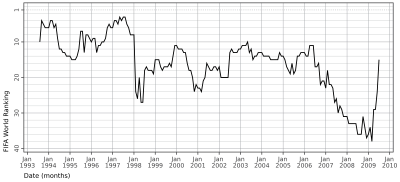
Morten Olsen became the new manager in 2000. The team was nicknamed the "Olsen Gang," like a famous Danish movie series. Olsen changed the team's tactics to be more attacking, focusing on wingers like Jesper Grønkjær and Dennis Rommedahl. He also insisted on using only fit players who played regularly for their clubs.
Denmark qualified for both the 2002 World Cup and Euro 2004. They had impressive group stage results, including a 2–0 win against France in 2002. However, they were eliminated in the round of 16 at the 2002 World Cup and the quarter-finals at Euro 2004.
Denmark did not qualify for the 2006 World Cup or Euro 2008. But they qualified for the 2010 World Cup by winning their group. At the 2010 World Cup, they won one game but were eliminated in the group stage.
For Euro 2012, Denmark again won their qualifying group. They were in a tough group at the tournament with Germany, the Netherlands, and Portugal. They beat the Netherlands 1–0 but lost to Portugal and Germany, leading to their elimination.
Denmark failed to qualify for the next two major tournaments under Olsen. He left his role in November 2015.
Hareide Era (2016–2020)
Åge Hareide became the new coach in December 2015. Denmark qualified for the 2018 World Cup after beating the Republic of Ireland 5–1 in a play-off. Christian Eriksen scored a hat-trick in that game.
At the 2018 World Cup in Russia, Denmark was in Group C. They won their first game against Peru 1–0. They drew 1–1 with Australia and had the only goalless draw of the tournament against France. Both teams moved on to the knockout stage.
In the round of 16, Denmark faced Croatia. The game ended 1–1 after extra time. Croatia won the penalty shootout, ending Denmark's World Cup journey.
In September 2018, there was a dispute between the Danish Football Union (DBU) and the players' union about image rights. This led to an unusual situation where Denmark had to play a friendly match against Slovakia with an uncapped squad of mostly futsal and lower-league players. The regular players returned for the next game after a temporary agreement.
Hareide led Denmark to qualify for UEFA Euro 2020. However, due to the COVID-19 pandemic, the tournament was postponed to 2021. Hareide's contract ended in June 2020, and Kasper Hjulmand took over.
Hjulmand Era (2020–2024)
At UEFA Euro 2020, Denmark's first match against Finland was paused after Christian Eriksen suffered a heart attack. Denmark lost that game 1–0 and their second match to Belgium 2–1. But they made history by becoming the first team to qualify for the knockout stage of a European Championship despite two opening defeats, after a great 4–1 win against Russia.
They then beat Wales 4–0 in the round of 16 and the Czech Republic 2–1 in the quarter-finals. Their amazing run ended in the semi-finals with an extra-time loss to England. Denmark's performance was highly praised for their teamwork and spirit, especially after Eriksen's health scare.
Denmark also qualified for the 2022 World Cup, winning their qualifying group with nine victories. At the 2022 World Cup, they were in a group with France, Tunisia, and Australia. They drew with Tunisia, lost to France, and then lost to Australia, finishing last in their group.
For the UEFA Euro 2024 qualifiers, Denmark finished top of their group. At UEFA Euro 2024, they reached the round of 16 but were eliminated by Germany. Hjulmand resigned on July 19, 2024.
Riemer Era (2024–Present)
After Hjulmand, Morten Wieghorst was named manager but went on sick leave. Lars Knudsen became caretaker manager. Knudsen led Denmark in their first four UEFA Nations League matches, including two wins.
On October 24, 2024, Brian Riemer was named the new manager. His first match was a 2–1 loss to Spain in the UEFA Nations League.
In the Nations League quarter-finals in March 2025, Denmark played Portugal. They won the first leg 1–0 at home but lost the second leg 5–2 after extra time, losing 5–3 on aggregate. This was the first time Denmark reached the knockout stage of the UEFA Nations League.
Team Spirit and Fans
Supporters: The Roligans
Denmark is famous for its traveling fans, known as roligans. This group started in the 1980s to oppose hooliganism. The word "rolig" means "calm" in Danish. Roligans are known for their calm, cheerful, and passionate support. They are often seen as some of the best national team fans in the world. They even received the FIFA FairPlay Award in 1984.
However, in June 2007, a Danish fan ran onto the pitch during a Euro 2008 qualifying match against Sweden. He tried to attack the referee. The match was stopped, and UEFA awarded Sweden a 3–0 win as punishment.
Rivalry with Sweden
Denmark's main rival is Sweden. They have played 107 times. Denmark has won 40, drawn 20, and lost 47. Their first match was an 8–0 win for Denmark in May 1913.
In the 1992 European Championship, Denmark lost 1–0 to Sweden in the group stage. Both teams still advanced, and Denmark went on to win the tournament. At UEFA Euro 2004, they drew 2–2, which helped both teams move forward at Italy's expense.
In a Euro 2008 qualifier, Sweden was awarded a 3–0 win after a Danish fan attacked the referee. Denmark failed to qualify for that tournament. In the 2010 World Cup qualifiers, Denmark beat Sweden twice and qualified. In the play-offs for UEFA Euro 2016, Denmark lost to Sweden and did not qualify. The most recent match was a 2–1 win for Denmark in June 2024.
Team Kit
The team's kit is made by the Danish company Hummel. It is all red with white details, matching the colours of the Danish national flag. Hummel has been the kit provider since 2016, and also from 1979 to 2004.
| Kit provider | Period |
|---|---|
| 1979–2004 | |
| 2004–2016 | |
| 2016–present |
Broadcasts
All of Denmark's qualification, Nations League, and friendly matches are shown on TV 2. DR broadcasts the games on radio.
Home Stadium
Denmark's first home match was a 2–1 friendly win against England on May 25, 1910. It was played at "KBs baner" in Copenhagen. A new stadium, Idrætsparken, opened in 1911. It hosted most of the national team's home matches for 82 years. Denmark won 125 games there. The stadium's record attendance was 51,600 for a game against Sweden in 1957.
When Idrætsparken was rebuilt, it was renamed Parken (later Telia Parken). It reopened on September 9, 1992, with a capacity of 42,358. The current record attendance is 42,099. The capacity was later reduced to 38,009 seats. Parken is still the largest stadium in Denmark.
From 1992 to 2006, Parken was the only stadium for men's national team matches. However, because fewer people attended friendly matches, the DBU started playing some friendlies at smaller stadiums around Denmark. Qualifying matches for major tournaments are still played at Parken.
Recent Matches
The following are Denmark's match results from the last 12 months, and upcoming matches.
Win Draw Loss Fixture
2024 Matches
| 5 September 2024 2024–25 UEFA Nations League A | Denmark |
2–0 | Copenhagen, Denmark | |
| 20:45 CEST | Stadium: Parken Stadium Attendance: 26,024 Referee: Daniel Siebert (Germany) |
| 8 September 2024 2024–25 UEFA Nations League A | Denmark |
2–0 | Copenhagen, Denmark | |
| 18:00 CEST |
|
Stadium: Parken Stadium Attendance: 34,902 Referee: Chris Kavanagh (England) |
| 12 October 2024 2024–25 UEFA Nations League A | Spain |
1–0 | Murcia, Spain | |
| 20:45 CEST | Stadium: Estadio Nueva Condomina Attendance: 29,870 Referee: Ivan Kružliak (Slovakia) |
| 15 October 2024 2024–25 UEFA Nations League A | Switzerland |
2–2 | St. Gallen, Switzerland | |
| 20:45 CEST |
|
Stadium: Kybunpark Attendance: 16,182 Referee: Halil Umut Meler (Turkey) |
| 15 November 2024 2024–25 UEFA Nations League A | Denmark |
1–2 | Copenhagen, Denmark | |
| 20:45 CET | Stadium: Parken Stadium Attendance: 36,985 Referee: Rade Obrenović (Slovenia) |
| 18 November 2024 2024–25 UEFA Nations League A | Serbia |
0–0 | Leskovac, Serbia | |
| 20:45 CET | Stadium: Dubočica Stadium Attendance: 7,295 Referee: Felix Zwayer (Germany) |
2025 Matches
| 20 March 2025 2024–25 UEFA Nations League QF | Denmark |
1–0 | Copenhagen, Denmark | |
| 20:45 CET | Højlund |
Stadium: Parken Stadium Attendance: 36,322 Referee: Irfan Peljto (Bosnia and Herzegovina) |
| 23 March 2025 2024–25 UEFA Nations League QF | Portugal |
5–2 (a.e.t.) (5–3 agg.) |
Lisbon, Portugal | |
| 19:45 WET |
|
|
Stadium: Estádio José Alvalade Attendance: 47,123 Referee: Slavko Vinčić (Slovenia) |
| 7 June 2025 Friendly | Denmark |
2–1 | Copenhagen, Denmark | |
| 19:00 CET |
|
Stadium: Parken Stadium Attendance: 22,151 Referee: Antoniou Menelaus (Cyprus) |
| 10 June 2025 Friendly | Denmark |
5–0 | Odense, Denmark | |
| 19:00 CEST | Stadium: Odense Stadium Attendance: 13,087 Referee: Rohit Saggi (Norway) |
| 5 September 2025 2026 World Cup qualification | Denmark |
v | Copenhagen, Denmark | |
| 20:45 CEST | Stadium: Parken Stadium |
| 8 September 2025 2026 World Cup qualification | Greece |
v | Piraeus, Greece | |
| 21:45 EEST | Stadium: Karaiskakis Stadium |
| 12 October 2025 2026 World Cup qualification | Denmark |
v | Copenhagen, Denmark | |
| 20:45 CEST | Stadium: Parken Stadium |
| 15 November 2025 2026 World Cup qualification | Denmark |
v | Copenhagen, Denmark | |
| 20:45 CET | Stadium: Parken Stadium |
| 18 November 2025 2026 World Cup qualification | Scotland |
v | Glasgow, Scotland | |
| 19:45 GMT | Stadium: Hampden Park |
Coaching Staff
When the national team gathers for training and matches, they are coached by this team:
| Position | Name |
|---|---|
| Head Coach | |
| Assistant Coach | |
| Set Piece Coach | Vacant |
| Fitness Coach | |
| Goalkeeping Coach | |
| Match Analysts |
| Position | Name |
|---|---|
| Doctor | |
| Physiotherapists | |
| Sports Psychologist |
Team Managers Through History
The role of the Denmark national football team manager has changed over time. In the early years (1908-1918), a manager had overall responsibility. Then, for a long time (1919-1956), there was often no manager or only a temporary one.
Later, managers like Arne Sørensen (1956-1961) and Poul Petersen (1962-1966) were in charge of training and tactics. However, a special committee called UdtagelsesKomitéen chose the players.
From 1967 to 1969, the committee largely managed the team. The committee's chairman became the "tactical manager." In 1970, the DBU decided to have one manager with overall responsibility.
Until 1979, the manager shared player selection duties with the UdtagelsesKomitéen. The manager had three votes, and the four committee members had one each. In July 1979, Sepp Piontek became the first full-time professional manager. He was given full control over all manager-related decisions.
Manager List
This table shows all national team managers since the first official game in 1908. Note that from 1911 to 1961, many games were played without a specific manager.
| Manager | From | To | Record | Notes | ||||
|---|---|---|---|---|---|---|---|---|
| M | W | D | L | Win % | ||||
| October 1908 | December 1910 | 4 | 3 | 0 | 1 | 75.00 | ||
| No manager | January 1911 | December 1912 | 5 | 3 | 0 | 2 | 60.00 | |
| January 1913 January 1917 |
December 1915 December 1918 |
16 | 14 | 1 | 1 | 87.50 | ||
| No manager | January 1916 January 1919 |
December 1916 July 1920 |
10 | 5 | 1 | 4 | 50.00 | |
| Caretaker manager | August 1920 | August 1920 | 1 | 0 | 0 | 1 | 0.00 | |
| No manager | September 1920 | December 1938 | 77 | 35 | 13 | 29 | 45.45 | |
| Caretaker managers | January 1939 | October 1956 | 18 | 10 | 3 | 5 | 55.56 | |
| No manager | July 1939 | September 1956 | 74 | 29 | 11 | 34 | 39.19 | |
| November 1956 | December 1961 | 41 | 20 | 8 | 13 | 48.78 | ||
| No manager | June 1957 | September 1961 | 3 | 1 | 0 | 2 | 33.33 | |
| January 1962 | December 1966 | 47 | 17 | 8 | 22 | 36.17 | ||
| January 1967 | December 1967 | 8 | 4 | 2 | 2 | 50.00 | ||
| January 1968 | January 1969 | 11 | 4 | 1 | 6 | 36.36 | ||
| February 1969 | December 1969 | 9 | 5 | 1 | 3 | 55.56 | ||
| January 1970 | December 1975 | 61 | 20 | 11 | 30 | 32.79 | Qualified for the 1972 Summer Olympics — reached Quarter-finals | |
| January 1976 | June 1979 | 31 | 13 | 6 | 12 | 41.94 | ||
| 1 July 1979 | April 1990 | 115 | 52 | 24 | 39 | 45.22 | Euro 1984 — Semi-finals 1986 World Cup — Round of 16 Euro 1988 — Group stage |
|
| May 1987 May 1990 |
May 1988 June 1996 |
73 | 40 | 18 | 15 | 54.79 | Euro 1996 — Group stage |
|
| July 1996 | June 2000 | 40 | 17 | 9 | 14 | 42.50 | 1998 World Cup — Quarter-finals Euro 2000 — Group stage |
|
| July 2000 | November 2015 | 166 | 80 | 42 | 44 | 48.19 | 2002 World Cup — Round of 16 Euro 2004 — Quarter-finals 2010 World Cup — Group stage Euro 2012 — Group stage |
|
| December 2015 | 31 July 2020 | 42 | 21 | 18 | 3 | 50.00 | 2018 World Cup — Round of 16 Euro 2020 — Qualified |
|
| 5 September 2018 | 1 | 0 | 0 | 1 | 0.00 | |||
| 1 August 2020 | 19 July 2024 | 55 | 33 | 8 | 14 | 60.00 | Euro 2020 — Semi-finals 2022 World Cup — Group stage Euro 2024 — Round of 16 |
|
| 26 August 2024 | 24 October 2024 | 4 | 2 | 1 | 1 | 50.00 | ||
| 24 October 2024 | 6 | 3 | 1 | 2 | 50.00 | |||
| Total | 918 | 431 | 187 | 300 | 46.95 | |||
Manager Records
- Longest time as manager: Morten Olsen, 15 years
- Most wins: Morten Olsen, 80 wins
Players
Current Squad
The following 23 players were chosen for the friendly matches on June 7 and 10, 2025, against Northern Ireland and Lithuania.
- Caps and goals are correct as of June 10, 2025, after the match against Lithuania.
| No. | Pos. | Player | Date of birth (age) | Caps | Goals | Club |
|---|---|---|---|---|---|---|
| 1 | GK | Kasper Schmeichel (vice-captain) | 5 November 1986 | 114 | 0 | |
| 16 | GK | Oliver Christensen | 22 March 1999 | 1 | 0 | |
| 22 | GK | Filip Jörgensen | 16 April 2002 | 1 | 0 | |
|
|
||||||
| 2 | DF | Joachim Andersen | 31 May 1996 | 43 | 0 | |
| 3 | DF | Jannik Vestergaard | 3 August 1992 | 55 | 3 | |
| 4 | DF | Lucas Høgsberg | 23 June 2006 | 2 | 0 | |
| 5 | DF | Joakim Mæhle | 20 May 1997 | 52 | 11 | |
| 13 | DF | Rasmus Kristensen | 11 July 1997 | 28 | 2 | |
| 17 | DF | Patrick Dorgu | 28 October 2004 | 7 | 1 | |
| 18 | DF | Anton Gaaei | 19 November 2002 | 1 | 0 | |
|
|
||||||
| 6 | MF | Victor Froholdt | 25 February 2006 | 2 | 0 | |
| 7 | MF | Matt O'Riley | 21 November 2000 | 4 | 0 | |
| 10 | MF | Christian Eriksen | 14 February 1992 | 144 | 46 | Unattached |
| 14 | MF | Mikkel Damsgaard | 3 July 2000 | 32 | 4 | |
| 15 | MF | Christian Nørgaard | 10 March 1994 | 35 | 1 | |
| 21 | MF | Morten Hjulmand | 25 June 1999 | 19 | 1 | |
| 23 | MF | Pierre-Emile Højbjerg (captain) | 5 August 1995 | 88 | 11 | |
|
|
||||||
| 8 | FW | Gustav Isaksen | 19 April 2001 | 9 | 3 | |
| 9 | FW | Rasmus Højlund | 4 February 2003 | 26 | 8 | |
| 11 | FW | Mika Biereth | 8 February 2003 | 4 | 1 | |
| 12 | FW | Kasper Dolberg | 6 October 1997 | 55 | 12 | |
| 19 | FW | Anders Dreyer | 2 May 1998 | 5 | 1 | |
| 20 | FW | Carlo Holse | 2 June 1999 | 1 | 0 | |
Recent Call-ups
These players were also called up within the last twelve months.
| Pos. | Player | Date of birth (age) | Caps | Goals | Club | Latest call-up |
|---|---|---|---|---|---|---|
| GK | Mads HermansenINJ | 11 July 2000 | 0 | 0 | v. |
|
| GK | Peter Vindahl Jensen | 16 February 1998 | 0 | 0 | v. |
|
| GK | Frederik RønnowRET | 4 August 1992 | 10 | 0 | v. |
|
|
|
||||||
| DF | Victor Nelsson | 14 October 1998 | 16 | 0 | v. |
|
| DF | Victor Kristiansen | 16 December 2002 | 18 | 0 | v. |
|
| DF | Mads RoerslevINJ | 24 June 1999 | 1 | 0 | v. |
|
| DF | Mads Bech Sørensen | 7 January 1999 | 0 | 0 | v. |
|
| DF | Alexander BahINJ | 9 December 1997 | 20 | 1 | v. |
|
| DF | Asger SørensenINJ | 5 June 1996 | 0 | 0 | v. |
|
| DF | Rasmus NicolaisenINJ | 16 March 1997 | 0 | 0 | v. |
|
|
|
||||||
| MF | Morten Frendrup | 7 April 2001 | 2 | 0 | v. |
|
| MF | Jesper LindstrømINJ | 29 February 2000 | 18 | 1 | v. |
|
| MF | Albert GrønbækINJ | 23 May 2001 | 6 | 1 | v. |
|
| MF | Jens Stage | 8 November 1996 | 2 | 0 | v. |
|
| MF | Mads Bidstrup | 25 February 2001 | 0 | 0 | v. |
|
| MF | Mathias Jensen | 1 January 1996 | 30 | 1 | v. |
|
| MF | Maurits Kjærgaard | 26 June 2003 | 0 | 0 | v. |
|
|
|
||||||
| FW | Mathias Kvistgaarden | 15 April 2002 | 1 | 0 | v. |
|
| FW | Andreas Skov Olsen | 29 December 1999 | 39 | 8 | v. |
|
| FW | Jonas WindINJ | 7 February 1999 | 35 | 8 | v. |
|
| FW | Conrad Harder | 7 April 2005 | 1 | 0 | v. |
|
| FW | Yussuf Poulsen | 15 June 1994 | 86 | 14 | v. |
|
|
||||||
Player History
The national team manager chooses the players. They usually gather at Hotel Marienlyst in Elsinore for a week of training before a match. Friendly matches are often played on a Wednesday. World Cup and Euro qualifiers are played on specific days, like Friday and Tuesday evenings.
Best Danish Footballers Ever
In November 2006, the DBU nominated eight players for the "Best Danish Footballer of All Time" award. These included Morten Olsen, Allan Simonsen, Preben Elkjær, Michael Laudrup, Brian Laudrup, Peter Schmeichel, and Jon Dahl Tomasson. Fans voted, and Michael Laudrup won with 58% of the votes.
Hall of Fame
Denmark's Hall of Fame was created in October 2008. It celebrates the best players, teams, and coaches in the national team's history. A jury chooses one or two new members each year. The awards are given out at the Danish Football Awards. Hall of Fame members also leave a bronze footprint at the DBU headquarters. In May 2014, the DBU added nine more members from the early years of the team (1908-1964).
Hall of Fame Members
Listed by their last year playing for the national team.
- Sophus "Krølben" Nielsen (1908–1919)
- Nils Middelboe (1908–1920)
- Sophus "Målmand" Hansen (1911–1920)
- Carl "Skoma'r" Hansen (1918–1921)
- Poul "Tist" Nielsen (1910–1925)
- Michael Rohde (1915–1931)
- Valdemar Laursen (1918–1934)
- Fritz Tarp (1918–1934)
- Pauli Jørgensen (1925–1939)
- 1948 Summer Olympics team (July–August 1948)
- John Hansen (1948)
- Carl Aage Præst (1945–1949)
- Jørgen Leschly Sørensen (1946–1949)
- Eigil Nielsen (1940–1951)
- Knud Lundberg (1943–1956)
- Aage Rou Jensen (1945–1957)
- 1960 Summer Olympics team (August–September 1960)
- Harald Nielsen (1959–1960)
- Henry From (1957–1961)
- Jørgen Olesen (1951–1962)
- Poul Pedersen (1953–1964)
- Henning Enoksen (1958–1966)
- Ole Madsen (1958–1969)
- Ulrik le Fevre (1965–1976)
- Johnny Hansen (1965–1978)
- Henning Jensen (1972–1980)
- Per Røntved (1970–1982)
- Allan Simonsen (1972–1986)
- Frank Arnesen (1977–1987)
- Preben Elkjær (1977–1988)
- Søren Lerby (1978–1989)
- Danish Dynamite team (1980–1989)
- Sepp Piontek (Manager 1979–1990)
- Jan Mølby (1982–1990)
- Euro 1992 team (June 1992)
- Lars Høgh (1983–1995)
- Richard Møller Nielsen (Manager 1990–1996)
- Michael Laudrup (1982–1998)
- Brian Laudrup (1987–1998)
- Peter Schmeichel (1987–2001)
- Thomas Helveg (1994–2007)
- Jon Dahl Tomasson (1997–2010)
- Morten Olsen (1970–1989, Manager 2000–2015)
Player Records
- Players in bold are still playing for Denmark.
Most Appearances
| Rank | Player | Caps | Goals | Position | Period |
|---|---|---|---|---|---|
| 1 | Christian Eriksen | 144 | 46 | MF | 2010–present |
| 2 | Simon Kjær | 132 | 5 | DF | 2009–2024 |
| 3 | Peter Schmeichel | 129 | 1 | GK | 1987–2001 |
| 4 | Dennis Rommedahl | 126 | 21 | MF | 2000–2013 |
| 5 | Kasper Schmeichel | 114 | 0 | GK | 2013–present |
| 6 | Jon Dahl Tomasson | 112 | 52 | FW | 1997–2010 |
| 7 | Thomas Helveg | 108 | 2 | DF | 1994–2007 |
| 8 | Michael Laudrup | 104 | 37 | MF/FW | 1982–1998 |
| 9 | Martin Jørgensen | 102 | 12 | MF | 1998–2011 |
| Morten Olsen | 102 | 4 | DF | 1970–1989 |
Top Goalscorers
| Rank | Player | Goals | Caps | Average | Period |
|---|---|---|---|---|---|
| 1 | Poul Nielsen (list) | 52 | 38 | 1.37 | 1910–1925 |
| Jon Dahl Tomasson | 52 | 112 | 0.46 | 1997–2010 | |
| 3 | Christian Eriksen | 46 | 144 | 0.32 | 2010–present |
| 4 | Pauli Jørgensen | 44 | 47 | 0.94 | 1925–1939 |
| 5 | Ole Madsen | 42 | 50 | 0.84 | 1958–1969 |
| 6 | Preben Elkjær | 38 | 69 | 0.55 | 1977–1988 |
| 7 | Michael Laudrup | 37 | 104 | 0.36 | 1982–1998 |
| 8 | Nicklas Bendtner | 30 | 81 | 0.37 | 2006–2018 |
| 9 | Henning Enoksen | 29 | 54 | 0.54 | 1958–1966 |
| 10 | Michael Rohde | 22 | 40 | 0.55 | 1915–1931 |
| Ebbe Sand | 22 | 66 | 0.33 | 1998–2004 |
Team Achievements
Major Competitions
- UEFA European Championship
 Champions (1): 1992
Champions (1): 1992
- FIFA Confederations Cup
 Champions (1): 1995
Champions (1): 1995
- Olympic Games
- CONMEBOL–UEFA Cup of Champions
Regional Titles
Friendly Tournament Wins
- Lunar New Year Cup
- Champions (2): 1994, 2006
- King's Cup (Thailand)
- Champions (1): 2010
Awards
- FIFA Fair Play Award: 2021
- World Soccer Team of the Year: 1992
- Guerin Sportivo Team of the Year: 1983
- UNESCO Fair Play Trophy: 2002
Summary of Major Honours
| Competition | Total | |||
|---|---|---|---|---|
| Olympic Games | 0 | 3 | 1 | 4 |
| FIFA Confederations Cup | 1 | 0 | 0 | 1 |
| UEFA European Championship | 1 | 0 | 0 | 1 |
| CONMEBOL–UEFA Cup of Champions | 0 | 1 | 0 | 1 |
| Total | 2 | 4 | 1 | 7 |
Images for kids
-
FIFA World Rankings for Denmark, August 1993 – July 2009
See also
 In Spanish: Selección de fútbol de Dinamarca para niños
In Spanish: Selección de fútbol de Dinamarca para niños
 | Claudette Colvin |
 | Myrlie Evers-Williams |
 | Alberta Odell Jones |


